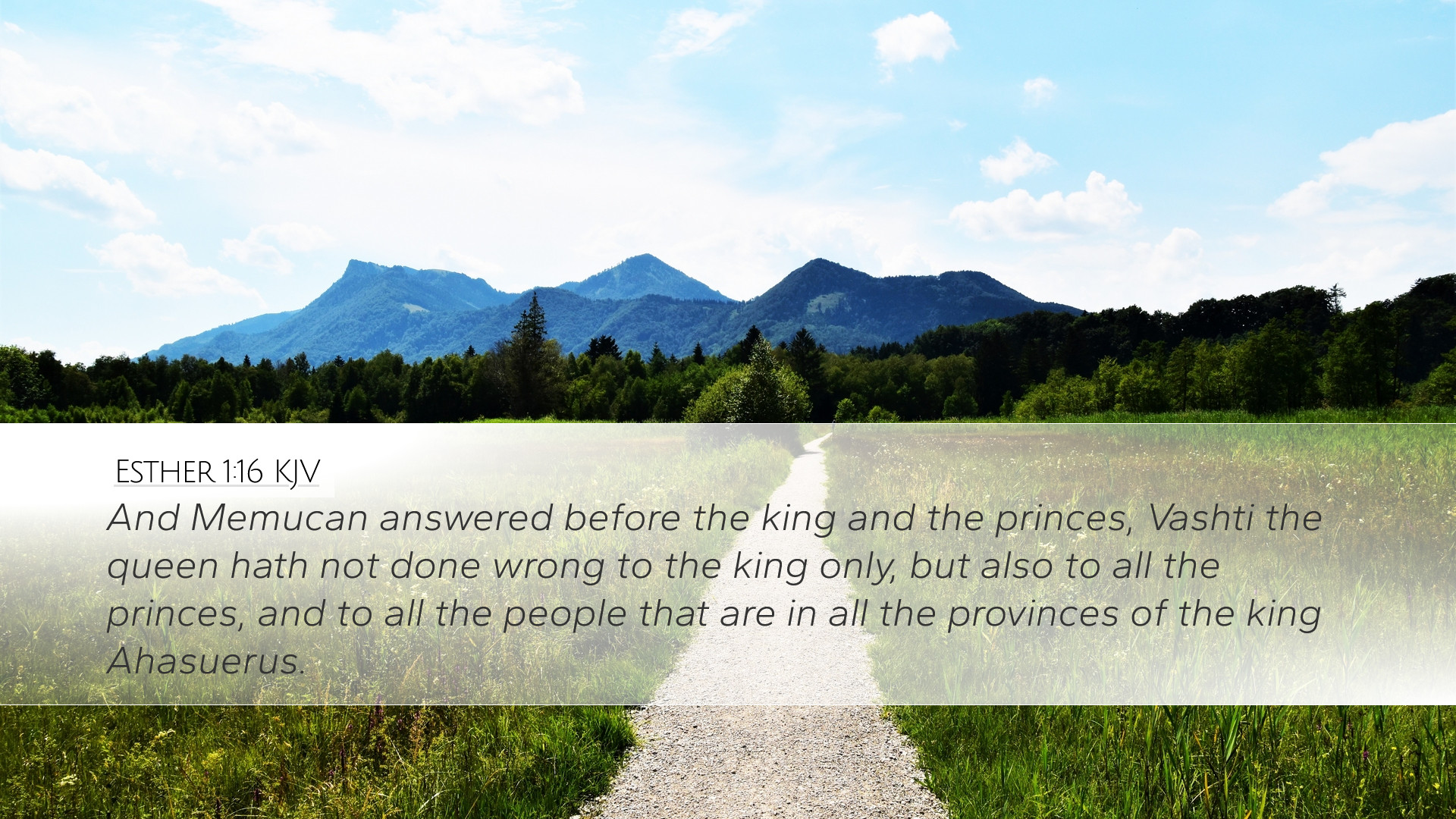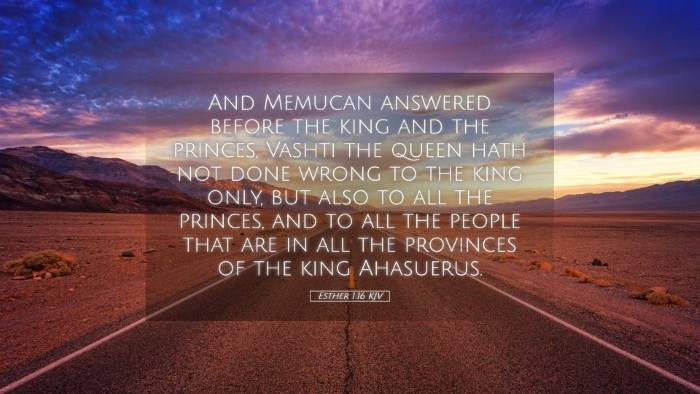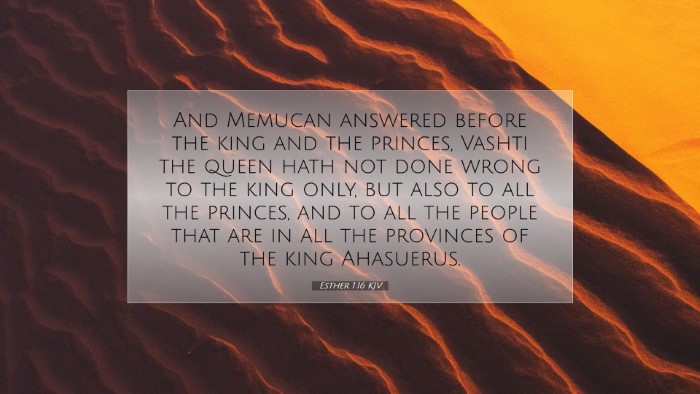Old Testament
Genesis Exodus Leviticus Numbers Deuteronomy Joshua Judges Ruth 1 Samuel 2 Samuel 1 Kings 2 Kings 1 Chronicles 2 Chronicles Ezra Nehemiah Esther Job Psalms Proverbs Ecclesiastes Song of Solomon Isaiah Jeremiah Lamentations Ezekiel Daniel Hosea Joel Amos Obadiah Jonah Micah Nahum Habakkuk Zephaniah Haggai Zechariah MalachiEsther 1:16
Esther 1:16 KJV
And Memucan answered before the king and the princes, Vashti the queen hath not done wrong to the king only, but also to all the princes, and to all the people that are in all the provinces of the king Ahasuerus.
Esther 1:16 Bible Commentary
Commentary on Esther 1:16
The verse reads:
“And Memucan answered before the king and the princes, Vashti the queen hath not done wrong to the king only, but also to all the princes, and to all the people that are in all the provinces of the king Ahasuerus.” (Esther 1:16)
This commentary aims to explore the implications and interpretations of Esther 1:16, drawing on insights from established public domain commentators like Matthew Henry, Albert Barnes, and Adam Clarke.
Context of Esther 1:16
To fully appreciate the weight of Memucan's statement, one must consider the surrounding context of the Book of Esther. This segment of Scripture describes an opulent feast hosted by King Ahasuerus, where a significant event unfolds—Queen Vashti’s refusal to appear before the king. Her defiance sets off a chain of events that will ultimately change the course of Israelite history.
Significance of Memucan's Response
Memucan's response to the King's inquiry relates not only to Vashti’s actions but extends to the broader implications for society. Here are several key points gathered from the commentaries:
- Direct Rebellion: Memucan emphasizes that Vashti's refusal was not just a personal affront to Ahasuerus, but an act that sets a dangerous precedent for women in the empire. This highlights a perception of the monarchy's absolute authority.
- Impact on Governance: Memucan articulates a fear that Vashti’s disobedience could embolden other women, thereby undermining the established social order. The monarchy's stability depended upon women knowing their place in relation to men, particularly within the context of a patriarchal society.
- Collective Responsibility: The mention of "all the princes" and "all the people" indicates a collective interest in maintaining order. The implications of Vashti's behavior extend beyond personal grievance to the potential social upheaval it could cause.
Theological Reflections
Reflecting on Memucan’s statement prompts a deeper theological inquiry into authority, rebellion, and societal norms:
- Authority in Scripture: The Bible often explores themes of godly authority and submission. Memucan reinforces the idea that civil authority should be respected. For pastors, this presents teachings on the nature of authority within both the sacred and secular realms and the expectations of those in subordinate positions.
- Consequences of Disobedience: The severity of the consequences that Vashti faced for her actions serves as a cautionary tale. The commentaries remind leaders that disobedience, particularly to divine or instituted authority, carries significant implications.
Character of Memucan
This verse also sheds light on the character of Memucan. Commentators note various aspects of his personality:
- Wisdom and Cunning: While his advice may seem harsh, it is sage in preserving the king's authority. Pastoral insights could be drawn on the necessity of wise counsel in leadership scenarios.
- Politically Astute: Memucan's comments were likely self-serving to some extent, aiming to secure his own position. This leads to discussions about the motivations behind counsel given in church and secular leadership.
Application for Today
The lessons drawn from Esther 1:16 resonate with contemporary issues regarding gender roles, authority, and societal dynamics. Here are points for application:
- Understanding Gender Dynamics: Vashti’s story calls for a reflection on the perception of women in leadership roles within scriptural contexts and modern church settings. An exploration of the balance between authority and respect for individuals can be vital for congregational harmony.
- Authority vs. Autonomy: Memucan’s perspective opens dialogue about the relationship between personal autonomy and institutional authority. This theme is relevant for current discussions on church governance, creating policies that respect individual dignity while upholding collective order.
Conclusion
In summary, Esther 1:16 serves as a rich source for theological reflection and practical application. It urges leaders, theologians, and students to ponder the dynamics of authority, the role of women in scripture, and the delicate balance between order and individual agency. By examining the insights provided through public domain commentaries, one can appreciate the intricate layers of meaning in this seemingly straightforward verse.


